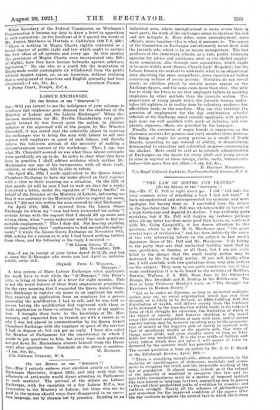(To THE EDITOR OF THE " SPECTATOR.") SIR,—M a y I entirely
endorse your excellent article on Labour Exchanges (Spectator, August 13th), and only wish that the adherents of anti-waste would direct attention in Parliament to such matters? The perusal of the debate on Labour Exchanges, with the exception of a few Labour M.P.s, was favourable to the Ministry of Labour, but those who see no goo. d -in the system should voice. their disapproval in no uncer- tain language, not by absence but by presence. Residing in an industrial area, where unemployment is more severe than in most parts, the work of the exchanges seems to increase the evil and not mitigate it. More doles, more unemployment, more officials, more taxation—this is what it amounts to. The report of the Committee on Exchanges unfortunately never dealt with the juvenile side, which is by no means unimportant. The best products of the elementary schools, as a rule, prefer voluntary agencies for advice and assistance, such as the skilled employ- ment association, also through care committees, which ought to be more widely used (Scouts, Church Lads' Brigades); but the Labour Bureau are anxious to undertake what is an educational duty absorbing the more sympathetic, more experienced bodies concerning welfare of young persons. Statistics do not reveal much, as children placed by outside means appear in the Exchange figures, and the same cases more than once. One only has to study the Press to see that employers believe in securing employees by other methods than the juvenile section. Tho supervision of young people which the juvenile bureau under- takes till eighteen is in reality done by voluntary workers; but officialdom basks in the sunshine. May one also ventilate the question of employment for the day continuation schools? Officials of the Exchange select suitable applicants with princi- pals none too well qualified with needs of industry, and tele- phones, expenses,-offices, are provided by the taxpayer.
Finally, the extension of wages boards is expensive, as the chairman receives five guineas and every member three guineas. The fixing of wages for young persons as a result of Trade Boards, according to age instead of ability, is demoralizing, detrimental to education and individual progress—encouraging the slacker. More could be said as to juvenile administration of Exchanges—as the desire for every adult and young person in time to register at these foreign, futile, costly, bureaucratic bodies—but space does not allow.-1 am, Sir, &c.,
D. HALLIDAY MACARTNEY.
C lo Royal Colonial Institute, Northumberland Avenue, W .C. 2.


































 Previous page
Previous page